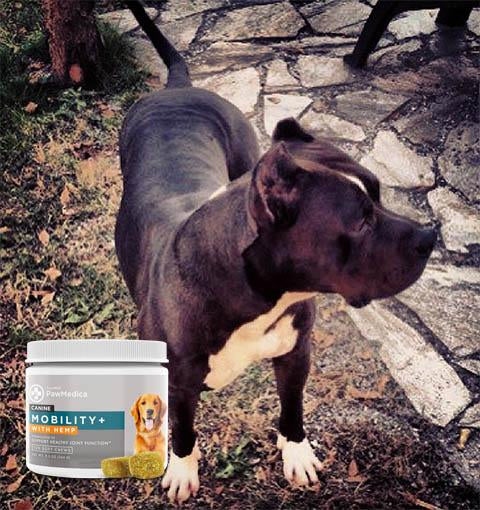
Good nutrition is important for dogs of all ages, but for certain age groups it takes on even greater importance: growing puppies and adolescents, pregnant and lactating females, and senior dogs.
Senior dogs
As dogs move from middle-aged into the senior stage of their life, they unfortunately start to suffer from gradual breakdown and dysfunction of their bodies and organs. These problems associated with normal aging generally include:
- Lack of mobility
- Gradual loss of visual and hearing acuity
- Increased difficulty in digesting and absorbing nutrients
- Gradual loss of muscle tone and increased levels of body fat
- Gradual loss of energy
- Tooth decay
When selecting a diet and supplements for a senior dog, these aspects of normal aging need to be taken into account. Obviously, no dog lives forever, but due to improved nutrition and veterinary care, nowadays it is not uncommon for large dogs to live into their late teens and increasing numbers of small dogs are making it into their 20s.
Considerations about ideal nutrition for a senior dog
First, there are no legal definitions of what a "senior dog food" is. Any dog food manufacturer can slap the label "senior" on any dog food regardless of its formulation, ingredients, or calorie content. So don't just run to the store and pick up a bag labelled "for seniors"; you are going to have to read the labels carefully.
Fit and trim
The first consideration about diet for a senior dog is keeping them trim. The number one health problem among dogs today is being overweight or even overtly obese, and keeping your dog at a healthy weight becomes increasingly harder as its metabolism slows during the middle-aged and senior period.
It is vitally important to keep your dog trim; being overweight has been shown to take years off a dog's life, exacerbate mobility issues, and increase the risk of the dog developing a number of nasty health conditions.
If you feed a high-quality food your dog has thrived on, you can keep feeding it as the dog becomes a senior, just gradually cut back on the amount you feed. Or you can switch to a lower calorie formula. Make sure you actually check the calorie content per cup; a weight-loss or weight-control food should have 350 kcal/cup or less. Some dog food companies advertise foods with more than 450 kcal/cup as weight-control foods which is a ridiculous claim.
As part of your weight control plan, it is vital that senior dogs get taken for a walk or a swim every single day. A young dog may self-exercise if turned out in a yard, but a senior dog generally will just take a nap. It's also a good idea to put the dog through a core and hind end muscle strengthening regimen three or four times a week.
Many senior dogs develop weak hind end muscles, and performing specific exercises can prevent this problem. You can easily find descriptions of appropriate muscle-building exercises online.
Digestible
Since senior dogs tend to have less efficient digestive tracts, it is important to feed high quality, easily digested ingredients. Dogs struggle to digest plant-based foods at the best of times, so your senior dog's diet should be meat-based.
Good choices of carbohydrates for seniors are the easily digested rice and oatmeal, or the sweet potato. Avoid foods that contain corn, soy, gluten, and legumes like lentils or chickpeas.
Should I decrease the protein content?
Absolutely not. Senior dogs actually need more protein than an adult dog; make sure your formula has at least 27% protein, or even think about switching to a high-protein raw diet. It's a complete myth that feeding low protein diets will "protect the kidneys"; if your dog actually has kidney disease, you may need to feed a low-protein diet, but feeding a low protein diet to a dog with healthy kidneys will not reduce the risk of developing kidney disease.
The primary causes of kidney disease in dogs are infections and exposure to toxic substances like grapes and high doses of aspirin.
Supplements
You may want to consider adding supplements to your senior dog's diet, such as Glucosamine. for joint support. In addition, you may want to consider adding one of the follow supplements, such as:- Turmeric
- Chondroitin
- MSM
When is a dog a senior dog?
In general, a large dog reaches full physical and mental maturity by age three (which we can mentally compare to a human at age 21), enters the prime of its life until around age seven when it can be considered middle-aged (which we can mentally compare to a human at age 50), and then becomes a senior at age 10 (which we can mentally compare to a human at age 65 to 70). Small dogs have a different timeline, becoming mature at age 1.5 years, middle-aged at around age 13, and don't generally enter the senior phase until age 15 or so. Giant dogs have a very compressed timeline, many only becoming fully mature by age five, have only two years of a prime of life before entering middle age at seven and rapidly moving into the senior phase by age eight.
Note that traditionally the dog food industry and many veterinarians have completely ignored the differences in the timing of life stages of different sizes of dogs and have also completely ignored the existence of a middle aged phase of life. And thus you may have encountered rather ridiculous claims like all dogs are seniors by age seven or that one year of a dog's life equals seven years of a human's life. Many medium-sized agility dogs only reach their peak of performance at age seven and some go on to compete until age 14 or 15, and anyone who has ever met a toy poodle knows a seven-year-old toy poodle is NOT a senior dog.
In conclusion
The most important concerns when feeding a senior dog are:- Maintain a healthy body weight
- Supply sufficient protein
- Ensure the food is digestible
- Consider adding supplements


